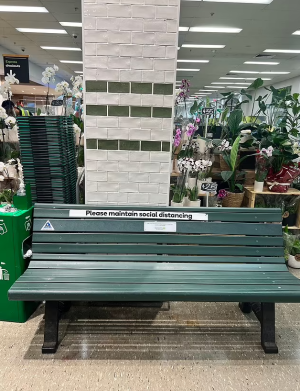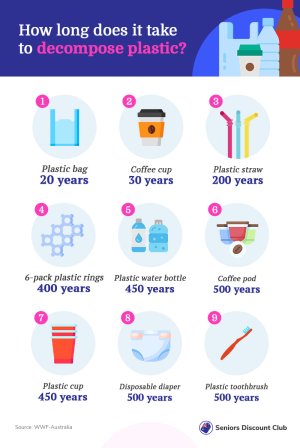Woolworths' new green initiative receives applause - but there’s a catch…
By
- Replies 8
Single-use plastic pollution is a major issue that we're all aware of. Despite our efforts to minimise the use of plastic bags and bottles, we often unconsciously use more plastic than we realise.
Using plastic has become a routine part of our lives, whether it's taking home a takeaway container, carrying a shopping bag, or washing our clothes (yes, there are microplastics in most of our garments).
The situation appears to be overwhelming, and it feels like the world is being engulfed by plastic.
However, every action counts towards reducing plastic waste, no matter how small it may seem.
That's why some Woolworths shoppers are applauding the retailer for including a 'unique' feature in some of its recent store landscaping projects.
Customers have recently noticed something very unusual about the green benches positioned outside of some of its supermarkets — they have been made from recycled shopping bags.
'Take a seat and rest easy knowing this bench is made from recycled shopping bags,' a sign on one of the benches reads.

So, how did this project come to fruition?
This unique seating option was made possible by REDCYCLE, a recycling network that works with its retailers to collect soft plastics such as single-use shopping bags, green reusable shopping bags, bread bags, wrappers, and frozen food bags.
The group requested customers to place plastic containers and wrappers with a recycling symbol and a 'return to store' label in the collection bins.
The shoppers embraced the project, with one shopper commenting: 'Once we started using REDCycle to recycle our soft plastics, our red-lid bin waste dropped significantly. So thankful for this program, it really made us notice how much single-use plastic we were using.'
The success of the initiative resulted in REDCycle collecting more than 5 million plastic pieces each day, which were then transformed into street furniture, benches, bollards, and other items.
However, customers were disappointed to find out that the recycling initiative had ceased operations, and the plastics could no longer be collected in the supermarket bins.
REDCycle was facing challenges with manufacturers and had received 350 times more plastics than needed for the items in demand, leading to stockpiling and an end to recycling collection.
As a result, Coles and Woolworths had to dispose of the 5,200 tonnes of recyclables destined for REDCycle into landfill.
Last Monday, the NSW Supreme Court ordered REDCycle's activities to wrap up as it was declared insolvent.
Coles and Woolworths have partnered and offered to take charge of the accumulated plastics from REDCycle.
Woolworths Group CEO, Brad Banducci expressed disappointment that REDCycle wasn't recycling the soft plastics it collected, promising that the supermarket giant is taking steps to rectify the situation.
He remarked: 'Coles and Woolworths have taken this step to provide reassurance to the public that the soft plastics they took the effort to deposit in REDcycle's bins won't be unnecessarily sent to landfill.’
'We know this may take some time. We hope REDcycle will allow us to help get the best outcome for the environment and restore community trust in our recycling systems.'
According to Matt Swindells, Coles’ Chief Operations and Sustainability Officer, the offer made by Coles and Woolworths to take control and safely store the stockpiled plastics from REDCycle reflect their commitment to finding the best environmental outcomes for their customers and the stockpiles.
He further stated that their goal is to collaborate with industry and governments to find viable solutions for soft plastic recycling in Australia, so customers can resume their efforts in sorting their soft plastics with confidence that they will be recycled.
Mr Swindells said: 'Collectively Coles and Woolworths have paid more than $20 million to REDcycle over the last decade to ensure this would happen, and we remain deeply disappointed by the unrecycled stockpiles.'

Members, this story serves as a reminder to be mindful of how much plastic we’re consuming and where the waste we produce ends up.
It’s a shame the great work of REDCycle had to come to a halt, but it’s encouraging to see Coles and Woolworths step up to find a solution and keep the public’s trust in the recycling system.
What do you think about this? Have you ever seen these ‘green benches’ at a Woolworths store? Better yet, do you think more retailers should step up and take responsibility for the amount of plastic waste they produce? Share your thoughts below!
Using plastic has become a routine part of our lives, whether it's taking home a takeaway container, carrying a shopping bag, or washing our clothes (yes, there are microplastics in most of our garments).
The situation appears to be overwhelming, and it feels like the world is being engulfed by plastic.
However, every action counts towards reducing plastic waste, no matter how small it may seem.
That's why some Woolworths shoppers are applauding the retailer for including a 'unique' feature in some of its recent store landscaping projects.
Customers have recently noticed something very unusual about the green benches positioned outside of some of its supermarkets — they have been made from recycled shopping bags.
'Take a seat and rest easy knowing this bench is made from recycled shopping bags,' a sign on one of the benches reads.

Woolworths customers have noticed that the benches outside the stores are made from recycled plastic shopping bags. Credit: Twitter.
So, how did this project come to fruition?
This unique seating option was made possible by REDCYCLE, a recycling network that works with its retailers to collect soft plastics such as single-use shopping bags, green reusable shopping bags, bread bags, wrappers, and frozen food bags.
The group requested customers to place plastic containers and wrappers with a recycling symbol and a 'return to store' label in the collection bins.
The shoppers embraced the project, with one shopper commenting: 'Once we started using REDCycle to recycle our soft plastics, our red-lid bin waste dropped significantly. So thankful for this program, it really made us notice how much single-use plastic we were using.'
The success of the initiative resulted in REDCycle collecting more than 5 million plastic pieces each day, which were then transformed into street furniture, benches, bollards, and other items.
However, customers were disappointed to find out that the recycling initiative had ceased operations, and the plastics could no longer be collected in the supermarket bins.
REDCycle was facing challenges with manufacturers and had received 350 times more plastics than needed for the items in demand, leading to stockpiling and an end to recycling collection.
As a result, Coles and Woolworths had to dispose of the 5,200 tonnes of recyclables destined for REDCycle into landfill.
Last Monday, the NSW Supreme Court ordered REDCycle's activities to wrap up as it was declared insolvent.
Coles and Woolworths have partnered and offered to take charge of the accumulated plastics from REDCycle.
Woolworths Group CEO, Brad Banducci expressed disappointment that REDCycle wasn't recycling the soft plastics it collected, promising that the supermarket giant is taking steps to rectify the situation.
He remarked: 'Coles and Woolworths have taken this step to provide reassurance to the public that the soft plastics they took the effort to deposit in REDcycle's bins won't be unnecessarily sent to landfill.’
'We know this may take some time. We hope REDcycle will allow us to help get the best outcome for the environment and restore community trust in our recycling systems.'
According to Matt Swindells, Coles’ Chief Operations and Sustainability Officer, the offer made by Coles and Woolworths to take control and safely store the stockpiled plastics from REDCycle reflect their commitment to finding the best environmental outcomes for their customers and the stockpiles.
He further stated that their goal is to collaborate with industry and governments to find viable solutions for soft plastic recycling in Australia, so customers can resume their efforts in sorting their soft plastics with confidence that they will be recycled.
Mr Swindells said: 'Collectively Coles and Woolworths have paid more than $20 million to REDcycle over the last decade to ensure this would happen, and we remain deeply disappointed by the unrecycled stockpiles.'
Key Takeaways
- Woolworths shoppers have noticed green benches outside stores made from recycled shopping bags.
- The plastic wrappers and containers donated in the bins were recycled through the REDCycle initiative, until it ceased operations and was declared insolvent in November 2022.
- Coles and Woolworths have offered to take control of the stockpiled plastics from REDCycle until a solution is found.
- REDCycle experienced challenges with manufacturers and reduced demand for recycled products due to market downturns and a fire at their facility.
Members, this story serves as a reminder to be mindful of how much plastic we’re consuming and where the waste we produce ends up.
It’s a shame the great work of REDCycle had to come to a halt, but it’s encouraging to see Coles and Woolworths step up to find a solution and keep the public’s trust in the recycling system.
What do you think about this? Have you ever seen these ‘green benches’ at a Woolworths store? Better yet, do you think more retailers should step up and take responsibility for the amount of plastic waste they produce? Share your thoughts below!








